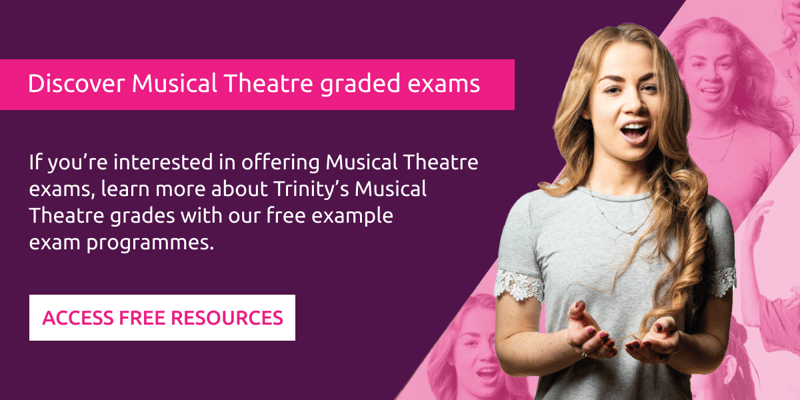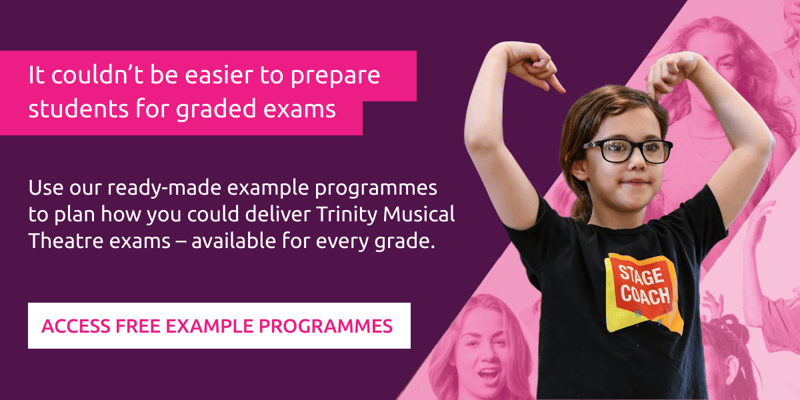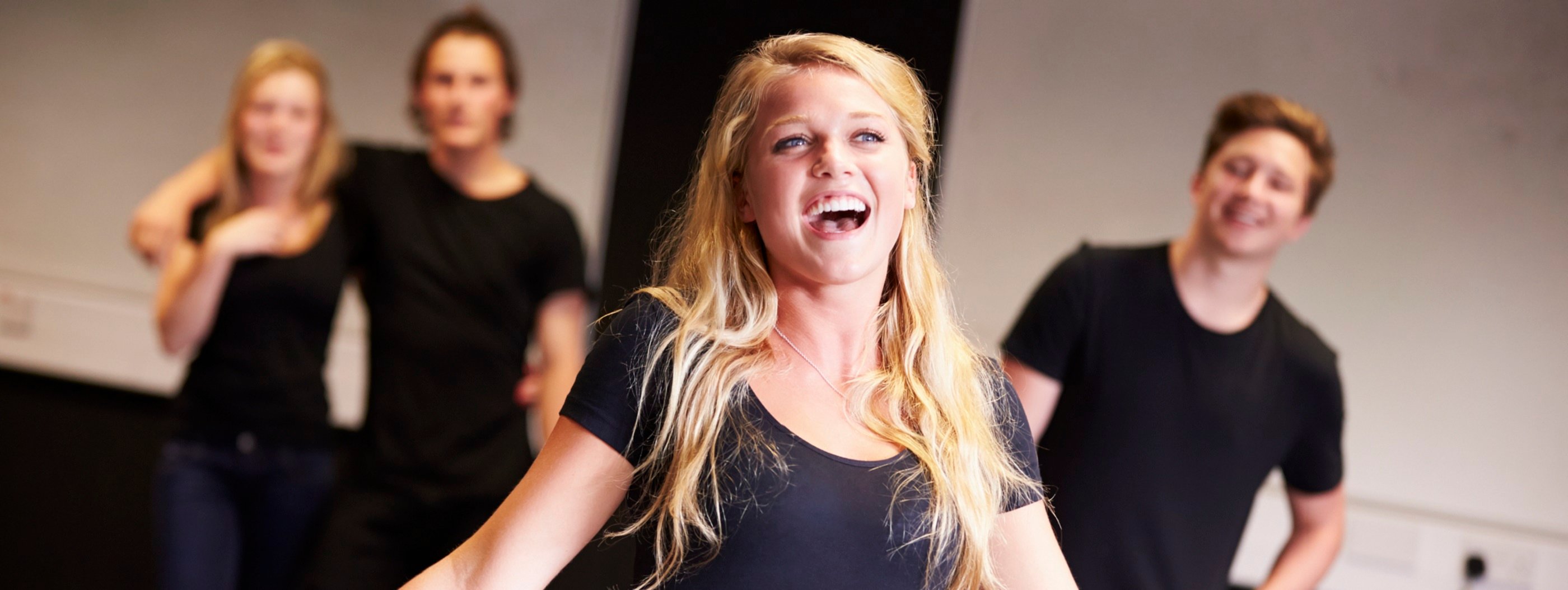
Five ways Musical Theatre exams help retain students

BY: Sue Clarke: Subject Expert - Drama
04 October 2022
Exams may hold associations of stress and anxiety for some, but at Trinity, we believe that exams should be enjoyable experiences that help develop students’ skills and confidence, and set them up for future success. We’ve designed our Musical Theatre exams in such a way that students look forward to them and centres can structure their courses and calendars around them. As Jennifer Pando, Principle of Stagecoach Solihull says:
‘My students are always so excited to show off what they’ve been working so hard on and exams are a fantastic opportunity to do that’.
There are many reasons students and teachers love Trinity Musical Theatre exams such as:
- Freedom of choice of musical theatre songs
- Industry professional examiners
- Unrivalled teacher resources and support.
It is key for Trinity that we ensure our exams both help pave the way to a professional career and remain accessible and productive for everyone. The exam experience has been constructed to help students be the best that they can be and gain a sense of achievement that keeps them engaged in learning and spurs them on to pursue drama school musical theatre auditions and then careers in the industry.
At Stagecoach Solihull, Jennifer notes:
‘The students enjoy the sense of achievement from doing the exams. When they come out, they’re really excited knowing that they did the very best performance they could have possibly done.’
Here are five ways that Trinity Musical Theatre exams engage students and help centres retain student numbers right the way through the age groups.
1. Create a powerful group bond
With the Trinity Musical Theatre syllabus, centres have the option to enter students into exams as pairs or groups, or for ‘In-production’ exams where an entire cast is assessed during a performance or rehearsal. Preparing for exams of this nature involves a lot of time spent together working towards a shared goal, and puts an added emphasis on exercising interpersonal skills such as empathy, communication, problem-solving, as well as core musical theatre skills. A shared goal can also assist with motivation, attention and attendance.
Students enjoy working together and naturally friendships and happy memories are formed. When it comes to the exam itself, the shared sense of achievement makes the experience even more magical and rewarding.
Parent, Michelle Bird explains how group exams benefited her then six-year-old daughter Milly Auchincloss and her classmates as part of their wider performing arts education at PQA Watford:
‘She did listen and absorb that this was actually a team effort. For her, it was an additional motivation. She and her friends seemed to think that they wanted to do their best as a team, and they didn’t want to let anyone else down.’
2. Opportunity to boost university applications
Trinity Musical Theatre exams demonstrate the qualities and experiences of students as well as giving them recognisable qualifications that add real value to university applications.
As Jennifer at Stagecoach Solihull notes, ‘Group exams look fantastic on a CV. It shows that you can work as part of a team, you can be relied on, you’re committed. Even if you’re not applying for acting training, it shows you’ve been committed to a team of people for a long time.’
As well as providing evidence of these personal attributes, Grade 6 and above Musical Theatre solo and pair exams carry UCAS points and can bridge the gap for students looking to go on to university.
Shelly Lowry, Founder of The Shelley Lowry School of Speech and Drama, describes one particular student’s experience:
‘One of our students recently won a place at Liverpool John Moores University to study teaching children with special needs. At his interview, they said, because of the UCAS points he had accrued with the Trinity exams and the experience that he had with performing, speech and drama and musical theatre productions, they were happy to offer him a two Cs for a course that he would normally have needed maybe an A and two Bs to get into.’
3. Students can incorporate their passions and develop valuable transferable skills
A key element of Trinity Musical Theatre exams is the freedom of repertoire selection. Students are encouraged to explore their passions and teachers have the ability to incorporate student interests and even tie in other subjects they are studying in school.
This practice is in full swing at The Shelley Lowry School of Speech and Drama. As described by Shelley, ‘What we really like about Trinity is that you don’t have to stick to a limited list of set texts. You are free to choose something that the student is interested in, however obscure. In this way, the work we can do outside of school really enhances our pupils’ school learning.’
This connection to their wider world also helps students use the skills gained through the Trinity Musical Theatre exams in other areas of their lives as they progress through school and on to work or further study. As Jennifer at Stagecoach Solihull notes, ‘Exams show you have a passion which can be translated into whatever students choose to do with their lives.’ In particular, the exams help her students develop confidence in their interview skills. She says, ‘Students really enjoy interviews and talking about themselves. They don’t have the dread and panic that some teenagers have when it comes to university or job interviews.’
4. Give everybody a chance to shine
Having the option of group and in-performance exams allows all students to participate and succeed in the exam process. For very young students and those who are naturally shy or quiet, these exams provide an inclusive pathway for them to build their confidence and gain qualifications.
Trinity Musical theatre examiners create a safe space for students to bring their best performance and get credit for it. Centres continually give feedback that our examiners are friendly and put students at ease, enabling them to channel their focus into giving the best performance, rather than being distracted by nerves. Aberdeen Academy of Performing Arts student, Rhiannon Knight, who has successfully completed a total of eight Musical Theatre grade exams explains: ‘Whenever I have taken a Trinity exam, I feel more confident in my musical theatre performances as the feedback always helps me improve’.
Parent, Michelle Bird describes her experience with PQA Watford:
‘I really loved the way that they did [the exam]. The [children] ended up getting credit for something that they were doing anyway. Some children, the minute you call it an exam, or they know that there’s a result, they find that quite stressful. Whereas for other children, that’s actually hugely motivating. They want the certificate, they want the recognition. So the way [the exam] was done, I think, managed to achieve both of those things.’
5. Recognise student achievements and create a sense of pride
As a triple threat exam, Trinity Musical Theatre is known for its high standards, which in turn instils pride in students and parents alike. As Shelley Lowry notes, ‘We know from our active social media network that a lot of students feel really proud of their Trinity certificates. There’s real pride in working towards something and with Trinity a high mark is always a reward for skill, hard work and effort.’
Further to this, Trinity Musical Theatre exams create the opportunity to recognise and attribute value to the arts, and recognise the broad depth of experiences being offered to young people in performing arts colleges. The exams don’t need to shape the curriculum, they are flexible enough to adapt to the performance pieces selected by the musical theatre school, teachers and students.
Shelley Lowry says:
‘I think the exams you choose as a teacher should reflect your standards and the aspirations that you have for your students. Trinity exams provide a challenge but are fairly and accurately marked. The flexibility of the syllabus makes for a varied, creative and adaptable teaching and learning experience.’



/Blog/Students.jpg)


Comments & Replies